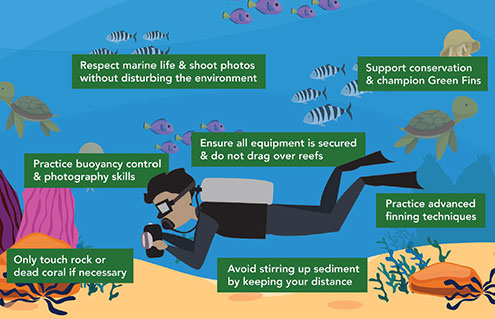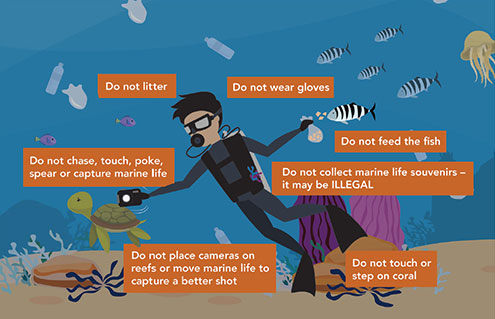Environmental Policy
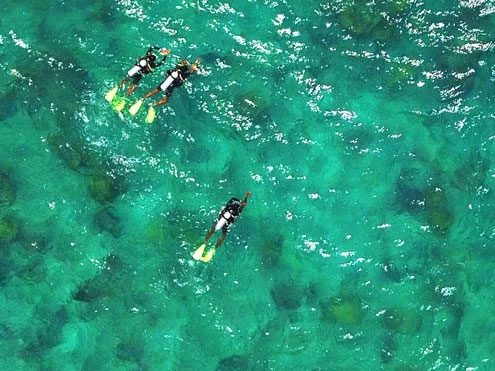
Statement of Responsibility
The Scuba Doctor operates in Rye, Victoria, Australia and acknowledges a responsibility to maintaining sustainable environmental practices.
The staff at The Scuba Doctor must at all times demonstrate commitment towards implementing practices which will promote environmental sustainability. The following policy governs the management of the environmental aspects of our company, with specific focus on education, best practice and ensuring respect for the land and marine environment.
Policy Statement
The Scuba Doctor will consistently strive to promote environmental awareness, encourage participation in local environmental activities and follow best practices in waste reduction, conservation of energy, spill mitigation, water preservation and protection of marine wildlife and habitat.
Implementing Principles
- Comply with any laws governing the environment
- Actively look for ways to implement our Environmental Policy
- Work towards the conservation of energy, water and resources in all our operations
- Strive to better understand both the direct and indirect impact that our practices may have on the environment.
- Promote environmental awareness on every dive outing or trip with every client
- Each month have at least one environmental focused Facebook post or email to our clients.
- Dispose of waste thoughtfully, and develop an attitude of "reducing, recycling and reusing".
- Lessen our environmental impact by purchasing environmentally-friendly products and services where possible.
- Regularly review our business practices and determine whether each practice is suitable in an environment friendly context.
Guidelines for Environmentally Friendly Diving and Snorkelling
"As divers and snorkellers, we are the ocean's partner in conservation."
Diving and snorkelling are fantastic activities to introduce people to the marine environment and create new ocean advocates. However, unmanaged, these activities can have acute negative impacts for fragile ecosystems.
Our policy and guidelines are based on the Green Fins conservation management approach which leads to a measurable reduction in the negative environmental impacts associated with diving and snorkelling. We aim to protect the marine environment through environmentally friendly guidelines promoting sustainable diving and snorkelling.
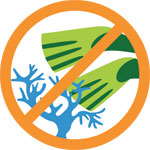 Do Not Step On The Coral
Do Not Step On The Coral
Consider where you're placing your feet and fins at all times. Most damaging contacts to the reef and marine life come from your fins. Corals and other marine growth are very fragile and some take a long time to grow. Stepping or kicking the corals can break it, damage its surface, or cut your feet. Improve your buoyancy and save marine life, plus try not to hit the sea floor on decent.
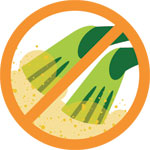 Do Not Stir The Sediment
Do Not Stir The Sediment
If you are not careful, your fins can stir up sediment and debris, upsetting small habitats and covering corals and other marine growth. This not only reduces the ability of the coral to photosynthesise, it can also lead to devastating coral diseases. Stirring sediment can also lead to small animals being washed away, or increase their chance of predation. So watch your finning and how much you are disturbing the sea floor, and especially watch out for the little critters, they are amazing too.
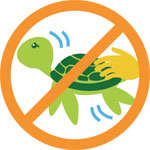 Do Not Chase or Touch Any Marine Life
Do Not Chase or Touch Any Marine Life
This can cause great stress to any animal. This can also transmit diseases or remove protective coatings of fish, mammals, invertebrates and other species. Look, but never touch and try not to get too close. Harassing marine animals, chasing them, trying to catch them or interfering with their homes or activities causes them undue stress. It is unnecessary and wrong. How would you like an alien to come down and messed with your house, knocked over everything, rode you around like a motorbike and conducted unnecessary anal probes. Remember when you dive with us, we believe that marine Animals and plants are not made to be touched by us land lubbers. If we see you doing it you wont dive with us again.
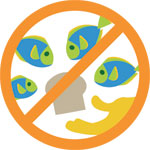 Do Not Feed The Fish
Do Not Feed The Fish
Feeding fish and any other species can cause them to rely on that food source. This also makes fish more aggressive towards divers because they expect to be fed. It can even lead to corals getting smothered in algae, as the reef fish no longer eat their natural food sources, like algae. So we do not allow feeding activities such as burley or feeding fish to entice them in for photos or viewing as it changes behaviours. Even if it's their natural food, the activity is harmful and damaging. Be reasonable and resist the urge.
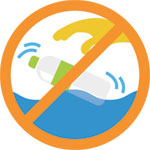 Do Not Throw Trash Into The Sea
Do Not Throw Trash Into The Sea
There are many problems with marine pollution, ranging from animals eating plastic bags and cigarette butts, to chemicals in the waste contaminating the water and entering the food chain. Marine pollution can be dangerous for humans too, after all, whatever we put in the ocean comes back to us when we eat seafood.
 Do Not Buy Corals or Marine Life As Souvenirs
Do Not Buy Corals or Marine Life As Souvenirs
Buying corals and other souvenirs encourages people to remove tons of marine life, dead or alive, from marine ecosystems to sell as souvenirs. Many of these species play vital roles in maintaining healthy reef ecosystems. If the buying stops, the killing and collecting will too. Corals look great in the ocean, but should not be taken home.
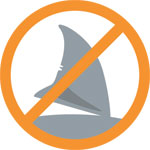 Do Not Support Shark Finning
Do Not Support Shark Finning
The Scuba Doctor is against the shark fin trade that causes over 100 million sharks to be killed each year. Sharks are primarily killed for their fins, which are used for soup. In some countries shark liver oil is believed to be a nutrient supplement and a cure for certain illnesses. Removing these top predators can create an imbalance in the marine ecosystem. Don't eat in restaurants that sell shark fin based dishes.
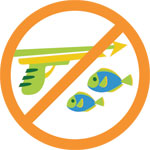 Do Not Spearfish On Scuba
Do Not Spearfish On Scuba
Spearfishing tends to remove the largest and slowest reproducing species, which can change the balance of the ecosystem and upset the food chain dramatically. It is also likely to injure a fish if it is not speared correctly, leading to a slow death. Spearfishing can also be dangerous to divers, snorkellers, and swimmers. While we appreciate the skills and techniques used to spearfish while apnea diving (i.e. by breath hold), we think doing so while scuba diving is unfair. It's also illegal in many places.
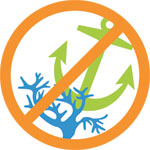 Do Not Anchor On Reefs
Do Not Anchor On Reefs
Anchors are heavy and typically have a long chain attached. When dropped onto a fragile reef, especially a coral one, they cause great destruction. If the boat changes direction with wind or currents, the anchor and chain will drag and cause more damage to our valuable reefs. Besides, keeping the dive boat live when diving at most local dive sites is usually a much safer option. See also Boat Diving Safety.
 Do Not Take Marine Life — Dead or Alive
Do Not Take Marine Life — Dead or Alive
Everything that originated in the ocean needs to be left there. It is all part of the marine environment. Removing species that would normally break down and be recycled into the sea leaves other animals without nutrients or elements that they need for growth. Hermit Crab shells are swapped from crab to crab and by removing them you are taking a potential home off the market. Even empty shells on the beach play an important role. Feel free to take rubbish, plastic or any dumped human items that are less than 75 years old, but shells, rocks, and coral should be left alone. (Please note: All shipwrecks and shipwreck relics/artefacts that are 75 years or older are automatically protected by The Victorian Heritage Act 2017 and the Heritage (Underwater Cultural Heritage) Regulations 2017.) Take nothing but pictures, leave nothing but bubbles, unless you are hunting for crays, abalone and scallops while abiding by all relevant laws and proceedures for doing so sustainably.
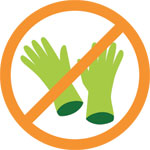 Do Not Wear Gloves In Order To Be Able to Touch Things
Do Not Wear Gloves In Order To Be Able to Touch Things
Wearing gloves gives you a false sense of protection and encourages you to hold onto things underwater. In addition to potentially damaging marine life and spreading disease, wearing gloves can be damangerous for you too. Often gloves will not provide adequate security against marine life that can be life threatening, and thus only give divers a false sense of security. Wearing gloves is only acceptable for protection from the cold in temperate and cold waters, plus when hunting for cray, abalone and scallops.
 Wear A Life Jacket At The Surface
Wear A Life Jacket At The Surface
This is recommended for all levels of snorkellers. From beginners to experienced snorkellers, wearing a life jacket helps you to avoid standing on or kicking shallow reefs, coral and marine life that can take many years to recover. Only when snorkelling in temperate and cold waters where the snorkeller is already wearing a wetsuit with appropriate buoyancy would wearing a lifejacket not be recommended.
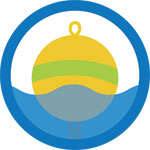 Use Mooring Buoys
Use Mooring Buoys
By using mooring buoys provided, or shot lines, destructive impacts on reefs, coral and wrecks can be avoided or at least minimised. This practice also sets a good example for others and raises awareness of the highly damaging practice of anchoring. See also Boat Diving Safety.
 Report Environmental Violations
Report Environmental Violations
Report destructive practices and violations of environmental laws. Tell your dive guide, dive operator, or community leaders and government officials. Informing key authorities of your observations can lead to appropriate action. By letting them know your concerns, you are being part of the solution.
 Participate In Marine Conservation Projects
Participate In Marine Conservation Projects
The ocean is the largest ecosystem on Earth and is the primary life support system that is connected to nearly every economic activity on earth. This is why there should be more awareness on preserving the ocean. By participating in marine conservation projects you can have a possitive effect on the environment and help educate others. A little help from everybody goes a long way.
Help us to lead by example and help your dive buddies be better divers.
7 Things Divers Must Do
- Respect marine life and shoot photos without disturbing the environment
- Support conservation and champion Green Fins
- Ensure all equipment is secured and do not drag over reefs
- Practice buoyancy control and photography skills
- Practice advanced finning techniques
- Only touch rock or dead coral if necessary
- Avoid stirring up sediment by keeping your distance
7 Things Divers Must Not Do
- Do not litter
- Do not wear gloves so you can touch things
- Do not feed the fish
- Do not chase, touch, poke, spear or capture marine life — unless legal to do so
- Do not collect marine life souvenirs — it may be ILLEGAL
- Do not place cameras on reefs or move marine life to capture a better shot
- Do not touch or step on reefs and coral

